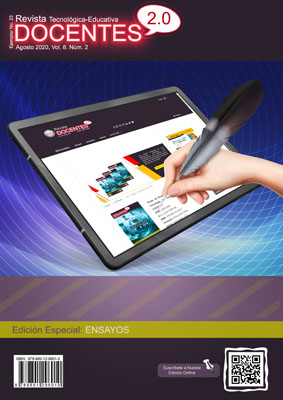The Teacher in Quarantine Time
 DOI:
https://doi.org/10.37843/rted.v8i2.154
DOI:
https://doi.org/10.37843/rted.v8i2.154
Main Article Content
Abstract
The study process has been threatened in these times by the Covid-19 pandemic, like other activities, which is focused on virtuality. Teachers' concern about the sudden change in education has created an area of ??confusion because they have had to leave the physical classrooms digitally, that is, they feel a little afraid of violent change due to deficiency and ignorance of virtual tools at some educational levels. The objective of this essay tries to carry out a critical analysis on the attitude or posture of teachers in the use and adaptation of technologies, which has been affected by the Coronavirus, and which has generated discomfort in the educational environment due to a lack of technological infrastructure, deficiency in teacher training, and even deficiency of support from the Education Districts and therefore from the Ministry of Education of Ecuador in this context it is important to clarify that through this situation that the country is experiencing, it has been concluded that in the educational process of the different areas, there are deficiencies in knowledge and management of the use of digital platforms and virtual tools; This makes both educational and government institutions emphasize training and management of technological tools that help student training and strengthen the capacities of teachers.
Downloads
Metrics
Article Details

This work is licensed under a Creative Commons Attribution-NonCommercial-NoDerivatives 4.0 International License.
Those authors who have publications in our journal accept the following terms:
- When a work is accepted for publication, the author retains rights of reproduction, distribution of his/her article for exploitation in all countries of the world in the format provided by our magazine and any other magnetic medium, optical, and digital.
- Authors will retain their copyright and guarantee the journal the right first to publish their work, which will be simultaneously subject to the Creative Commons Acknowledgment License (Attribution-NonCommercial-NoDerivatives 4.0 International (CC BY-NC-ND 4.0)). That allows third parties to copy and redistribute the material in any medium or format, under the following conditions: Acknowledgment - You must properly acknowledge authorship, provide a link to the license, and indicate if any changes have been made. You may do so in any reasonable way, but not in a way that suggests you have the licensor's endorsement or receive it for your use. NonCommercial - You may not use the material for a commercial purpose. NoDerivatives - If you remix, transform, or build from the material, you cannot broadcast the modified material. There are no additional restrictions - You cannot apply legal terms or technological measures that legally restrict you from doing what the license allows.
- Authors may adopt other non-exclusive license agreements to distribute the published version of the work (e.g., deposit it in an institutional archive or publish it in a monographic volume) provided that the initial publication in this journal is indicated.
- Authors are allowed and recommended to disseminate their work through the Internet (e.g., in institutional telematic archives, repositories, libraries, or their website), producing exciting exchanges and increasing the published work's citations.
- Request of withdrawal an article has to be done in writing by the author to the Editor, becoming effective after a written response from the Editor. For this purpose, the author or authors will send correspondence via e-mail: [email protected].
- The author will not receive financial compensation for the publication of his work.
- All Docentes 2.0 Journal publications are under the Open Journal System (OJS) platform at: https://ojs.docentes20.com/.
References
Fuentealba, R., & Imbarack, P. (2014). Compromiso docente, una interpelación al sentido de la profesionalidad en tiempos de cambio. Revista Estudios pedagógicos (Valdivia), 40(1), 1- 13. Recuperado de: https://scielo.conicyt.cl/scielo.php?script=sci_arttext&pid=S0718-07052014000200015
García, M., Reyes, J., & Godínez, G. (2017). Las Tic en la educación superior, innovaciones y retos. Revista Iberoamericana de las Ciencias Sociales y Humanísticas, 6(12), 2 - 18. Recuperado de: https://Dialnet-LasTicEnLaEducacionSuperiorInnovacionesYRetos-6255413.pdf
Ecuadorencifra. (2016). Tecnologías de la Información y Comunicaciones (TIC´S) 2016. Recuperado de: https://www.ecuadorencifras.gob.ec/documentos/web-inec/Estadisticas_Sociales/TIC/2016/170125.Presentacion_Tics_2016.pdf
El Comercio. (2019). Así es el uso de Internet en Ecuador. Corona Virus en el Ecuador. Recuperado de: https://www.expreso.ec/ciencia-y-tecnologia/internet-ecuador-479.html.
Ministerio de Educación. (2020). Lineamientos Generales Coronavirus. Recuperado de: https://educacion.gob.ec/lineamientos-generales-coronavirus
Resa, M. (2020). Tecnología y Enseñanza Situada. Revista Docente 2.0, 8(1), 33- 40. Recuperado de: https://ojs.docentes20.com/index.php/revista-docentes20/article/view/83/228
Romero, J. (2020). La Virtualización en las Organizaciones Universitarias. Un Nuevo Modelo de Gerencia Educativa. Revista Docente 2.0, 8(1), 21-25. Recuperado de: https://ojs.docentes20.com/index.php/revista-docentes20/article/view/84/220
UNESCO. (09 de junio de 2020). ¿Cómo estás aprendiendo durante la pandemia de COVID-19? Recuperado de: https://es.unesco.org/covid19/educationresponse
Urdiales, J., Armijos, L., & Urdiales, D. (2020). Estudiantes de un plantel educativo secundario del sur del Ecuador y un Entorno Virtual de Aprendizaje (EVA): Impacto de su implementación. Revista Andina de Educación, 3(2), 5-9. Recuperado de https://revistas.uasb.edu.ec/index.php/ree/article/view/1369/1282
Villafuerte, J., Bello, J., Pantaleón, Y., & Bermello, J. (2020). Rol de los docentes ante la crisis del covid-19, una mirada desde el enfoque humano. Revista Electrónica Formación y Calidad






